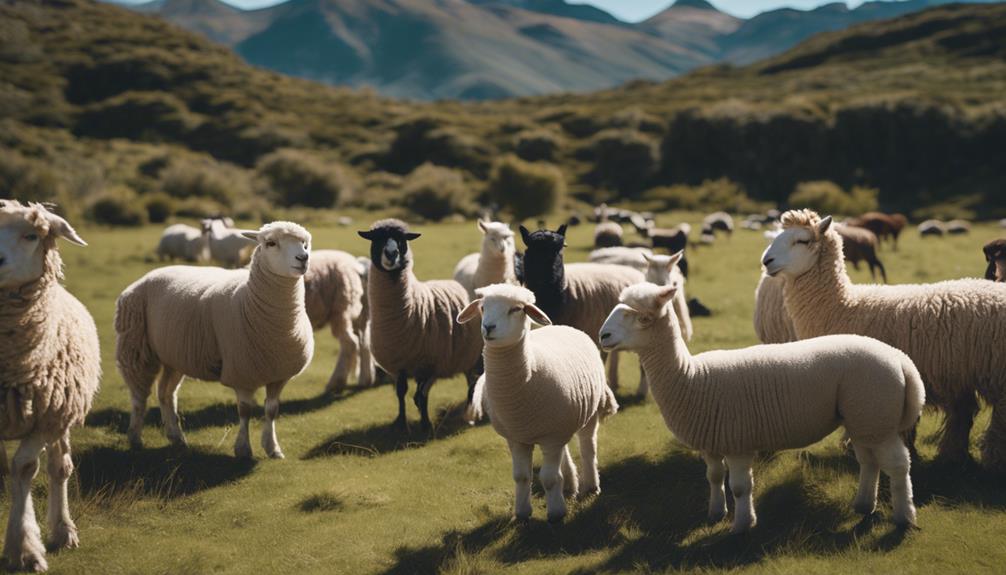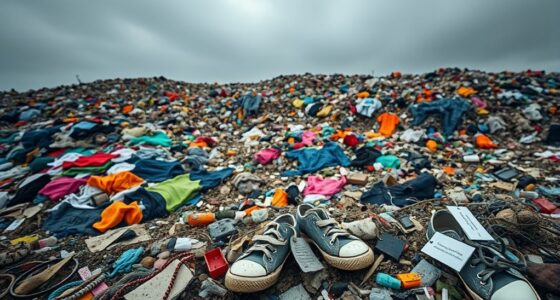Absolutely, Patagonia is a sustainable fashion choice that aligns with your values. They prioritize using recycled materials, ethical labor practices, and ensuring animal welfare in their supply chain. By incorporating recycled polyester, nylon, organic cotton, and wool, they significantly reduce their carbon footprint. Patagonia’s commitment to transparency includes regularly auditing suppliers to ensure fair wages and safe working conditions. Additionally, their ‘Don’t Buy This Jacket’ campaign challenges consumers to think critically about consumption. If you’re interested in comparing Patagonia to other brands or learning more about their sustainability efforts, you don’t want to miss what’s coming next.
Key Takeaways
- Patagonia uses a significant percentage of recycled materials, notably polyester and nylon, reducing its overall carbon footprint.
- The brand promotes ethical labor practices, ensuring living wages and regularly auditing working conditions for workers.
- Patagonia's animal welfare rating is 'Good', as it traces animal-derived materials and avoids controversial items like angora and fur.
- The 'Don't Buy This Jacket' campaign encourages consumers to reflect on their purchasing habits and the environmental impact of fast fashion.
Patagonia's Sustainability Practices
Patagonia's sustainability practices showcase a strong commitment to environmentally friendly production, prioritizing recycled materials and ethical labor standards in every step of their supply chain. By focusing on high-quality items made from recycled polyester, nylon, and wool, they aim to minimize their environmental impact and promote longevity over fast fashion trends. You'll find that a significant portion of their products also includes organic cotton, which reduces the harmful effects associated with conventional cotton farming.
The brand champions ethical and sustainable practices, ensuring that workers receive a living wage and working conditions are regularly audited. Patagonia goes further by tracing most animal-derived materials to uphold animal welfare, avoiding cruel practices such as angora and fur. They actively promote consumer awareness, encouraging you to think twice before making a purchase through campaigns like 'Don't Buy This Jacket.'
While Patagonia has made strides in improving its supply chain transparency, they acknowledge the ongoing need to refine their policies to prevent deforestation. Overall, choosing Patagonia means supporting a brand that's dedicated to responsible sourcing and sustainable practices, making a positive impact on both the planet and its people.
Environmental and Social Impact

By choosing Patagonia, you support a brand that not only prioritizes sustainable materials but also actively addresses its environmental and social impact throughout its operations.
Patagonia emphasizes the use of recycled materials, with a significant portion of its products made from recycled polyester, nylon, and wool. This commitment promotes sustainable alternatives in the fashion industry, helping to reduce the overall carbon footprint of your wardrobe.
The brand's 'Don't Buy This Jacket' campaign embodies its dedication to encouraging mindful consumption, urging you to reflect on the environmental issues tied to your purchases. Additionally, Patagonia guarantees ethical labor practices through rigorous supplier audits and certifications from Fair Labour Association and Fair Trade USA.
While the company has made strides in improving its animal welfare rating by avoiding harmful practices and tracing its materials, it acknowledges ongoing challenges, particularly in preventing deforestation within its supply chain.
This transparency highlights Patagonia's commitment to continuous improvement. By supporting Patagonia, you're not just buying clothing; you're participating in a movement focused on sustainability and social responsibility.
Transparency in Labor Conditions

A moderate score of 41-50% in the 2022 Fashion Transparency Index highlights Patagonia's commitment to revealing its labor practices and supply chain conditions.
You'll find that the brand implements supplier audits, guaranteeing that its partners adhere to ethical standards. Patagonia's corporate culture emphasizes transparency in labor conditions, fostering trust with consumers who care about fair labor practices.
In addition, Patagonia is dedicated to providing a living wage for workers involved in the final production stages, which reflects its commitment to fair compensation. They've also disclosed their COVID-19 response measures, demonstrating a proactive approach to protect workers during the pandemic.
This transparency not only showcases their accountability but also sets an example for the fashion industry. Moreover, Patagonia continues to evaluate and improve its labor practices, working to align with evolving ethical standards.
Animal Welfare Commitments

Improving its animal welfare practices, Patagonia has elevated its rating from 'It's a Start' to 'Good' by adopting a formal policy based on the Five Freedoms for animal treatment. This commitment reflects Patagonia's dedication to the ethical treatment of animals in its supply chain. By tracing most of its animal-derived materials, the brand guarantees that the sourcing aligns with its high ethical standards.
Patagonia uses recycled wool and down, which not only reduces waste but also promotes sustainability in fashion. Importantly, the brand avoids using controversial materials like angora, fur, and exotic skins, showing a clear stance against practices that compromise animal welfare. To further enhance its policies, Patagonia collaborates with Four Paws, an organization focused on humane treatment of animals.
Transparency plays a vital role in Patagonia's approach. The brand openly shares its sourcing practices and the measures it takes to guarantee ethical treatment. By using certified materials and maintaining these standards, Patagonia aims to minimize the environmental and ethical impact of its animal-derived products, making it a strong choice for conscious consumers looking to support sustainable fashion.
Comparing Ethical Fashion Brands

Comparing ethical fashion brands reveals how Patagonia stands out with its strong sustainability practices alongside other notable names like Outerknown and Alder. While all these brands prioritize eco-friendly practices, Patagonia's unique approach resonates with conscious consumers. It not only emphasizes reducing fast fashion's impact but also champions transparency in its operations.
Here are some key aspects to reflect on:
- Sustainability Commitment: Patagonia uses a significant percentage of recycled materials and encourages mindful consumerism through campaigns like 'Don't Buy This Jacket.'
- Animal Welfare Standards: Its animal welfare rating is 'Good,' reflecting responsible sourcing practices that align with companies like Toad&Co and Yuki Threads.
Frequently Asked Questions
How Sustainable Is Patagonia Really?
You'll find Patagonia emphasizes recycled materials and promotes product longevity, but its reliance on fossil fuels complicates its sustainability claims. While it makes strides, there's still room for improvement in transparency and sourcing practices.
Is Patagonia Still Ethical?
Is Patagonia still ethical? You'll find they've made strides in animal welfare and labor practices, yet challenges like supply chain transparency and deforestation remain. It's a mixed picture, but their commitment shows potential for improvement.
What Is so Special About Patagonia Clothing?
Patagonia clothing stands out for its use of recycled materials, commitment to ethical labor practices, and focus on durability. You'll appreciate their Worn Wear program, which encourages repairing instead of replacing, promoting a sustainable lifestyle.
Is Patagonia One of the Most Sustainable Companies?
You'll find Patagonia ranks highly among sustainable companies, thanks to its use of recycled materials and commitment to ethical practices. While it faces challenges, its proactive approach sets a strong example in the fashion industry.
What Makes Patagonia a Sustainable Fashion Choice?
Patagonia stands out in the sustainable fashion niche market surprise for its commitment to environmental and social responsibility. The brand prioritizes using recycled materials and ethical supply chain practices, making it a top choice for conscious consumers. Its dedication to sustainability sets a new standard in the fashion industry.
Conclusion
In the world of fashion, choosing Patagonia feels like stepping into a revitalizing breeze, where sustainability isn't just a buzzword but a promise.
Their dedication to the planet and its people paints a picture of responsible consumption. With transparent labor practices and a gentle touch towards our furry friends, you're not just wearing clothes; you're embracing a movement.
So, when you opt for Patagonia, you're not just making a choice; you're weaving a tapestry of positive change.









